
Food and Beverage
In the ever-evolving landscape of the food and drug industry, FDA approved seals continue to be an essential tool in safeguarding public health.
FDA approved seals play a crucial role in ensuring the safety and quality of food and drug products in the market. These seals are granted by the U.S. Food and Drug Administration (FDA) to certify that a product has met the necessary regulatory standards. With consumer safety as its top priority, the FDA seal provides reassurance to the public that a product has undergone rigorous testing and evaluation. This helps to build trust and confidence among consumers, as they can be confident that the product they are purchasing is safe and meets the FDA's high standards. The FDA seal solutions not only protect consumers but also serve as an incentive for manufacturers to maintain quality control and adhere to the strict guidelines set forth by the FDA. In the ever-evolving landscape of the food and drug industry, FDA approved seals continue to be an essential tool in safeguarding public health.

The materials that are approved for use in the food supply chain must be able to be used under the speeds and abrasive pressure of non-stop operating. The FDA compliant rubbers that are used must be non-toxic, non-allergenic and non-marking.
The main FDA approved materials for seal manufacturing are; Silicone, Viton (FKM), Nitrile, Neoprene and EPDM.
Silicone - Silicone has a wide range of properties that make it extremely useful in the production of consumables. These being, low toxicity, low chemical reactivity, heat-resistant and thermal stability. This thermal stability means that it has the widest range of temperatures it can operate in, -55°C to +225°C. There is even the option to use a low temperature silicone which means it can seal at temperatures down to -80°C.
Viton (FKM) - Viton, or Fluorocarbon, has a combination of impressive chemical resistance and also resistance to high temperatures. With its temperature ranges being between -25°C to +205°C. Viton is also practically invisible when it is underwater, plus it will not absorb water either. O-Rings made with this material will be used in devices that require resistance to high temperatures and fluids.
Nitrile - Nitrile is recommended throughout every facet of food processing and manufacturing of pharmaceuticals and cosmetics. It has brilliant oil resistance and temperature range of -35°C to +110°C. Nitrile is also non-toxic, non-allergenic and non-marking. It also has a long life, with it being able to withstand repeated temperature cycling.
Neoprene - Neoprene is one of the first synthetic materials to be created as a substitute for natural rubber. This was because it was an oil-resistant material, this means that it repels oily and greasy food products. Neoprene also has a nice smooth finish and a great resistance to abrasion. It is a much preferred material to be used for seals in refrigeration as well as being used in many transport and automotive industries.
EPDM - EPDM rubber is found in applications that require ruggedness and flexibility in the seal. It is used in the food and beverage industry because the material is tasteless and odorless. With these two properties it means EPDM can be used in both general purpose applications in the industry as well as specialty applications. EPDM has a heat range of -50°C to + 150°C.

